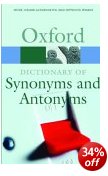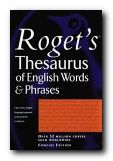lists of words, their alternatives, and their opposites
This Dictionary of Synonyms and Antonyms should appeal to a number of different users — editors, poets, crossword fans, and word puzzle solvers in general. It’s an easy-to-use source of over 150,000 alternative and opposite words to improve your wordpower and communication skills, and make your English more interesting and original. In fact it’s two books in one, because the dictionary is followed by a huge lexicon of what are termed ‘hard words’.
 These are unusual and obscure words you might wish to use in unusual circumstances, running from abattis (a defence made of felled trees with the boughs pointing outwards) to zymurgy (the branch of applied chemistry dealing with the use of fermentation in brewing). The main part of the book offers each headword entry followed by synonyms which are listed alphabetically, and antonyms are placed at the end of entries where appropriate. There are examples to show how words of less obvious senses are used, and markers such as ‘informal’, ‘derogatory’, and ‘obsolete’ highlight the usage style.
These are unusual and obscure words you might wish to use in unusual circumstances, running from abattis (a defence made of felled trees with the boughs pointing outwards) to zymurgy (the branch of applied chemistry dealing with the use of fermentation in brewing). The main part of the book offers each headword entry followed by synonyms which are listed alphabetically, and antonyms are placed at the end of entries where appropriate. There are examples to show how words of less obvious senses are used, and markers such as ‘informal’, ‘derogatory’, and ‘obsolete’ highlight the usage style.
For instance, let’s say you wanted to avoid repeating the word hard in a piece of writing. You look up the word and choose from a list of alternatives – and they are arranged in groups according to the sense in which the word is being used:
hard adj 1 adamantine, compact, compressed, dense, firm, flinty, frozen, hardened, impenetrable, impervious, inflexible, rigid, rocky, solid, solidified, steely, stiff, stony, unbreakable, unyielding. 2 hard labour. arduous, back-breaking, exhausting, fatiguing, formidable, gruelling, harsh, heavy, laborious, onerous, rigorous, severe, stiff, strenuous, taxing, tiring, tough, uphill, wearying. 3 a hard problem. baffling, complex, complicated, confusing, difficult, enigmatic, insoluble, intricate, involved, knotty, perplexing, puzzling, tangled, inf thorny. 4 a hard heart. callous, cold, cruel inf hard-boiled, hard-hearted, harsh, heartless, hostile, inflexible, intolerant, merciless, obdurate, pitiless, ruthless, severe, stern, strict, unbending, unfeeling, unfriendly, unkind. 5 a hard blow. forceful, heavy, powerful, strong, violent. 6 hard times. austere, bad, calamitous, disagreeable, distressing, grim, intolerable, painful, unhappy, unpleasant. 7 a hard worker. assiduous, conscientious, devoted, indefatigable, industrious, keen, persistent, unflagging, untiring, zealous. Opp EASY, SOFT. hard-headed > BUSINESSLIKE. hard-hearted > CRUEL. hard up > POOR. hard-wearing > DURABLE.
It has to be said that the synonyms fare better than the antonyms, and of course there are plenty of terms for which there are no antonyms – bicycle for instance. Plenty of synonyms – bike, cycle, two-wheeler – and so on, but no anti-bicycle.
This could also be very useful for crossword addicts in solving those clues which are posed in finding one word which means the same as another – as in ‘adamantine (4)’ = hard.
© Roy Johnson 2007
Alan Spooner (ed), Oxford Dictionary of Synonyms and Antonyms, Oxford: Oxford University Press, 2nd edition 2007, pp.528, ISBN: 0199210659
More on language
More on literary studies
More on writing skills
More on creative writing
More on grammar
